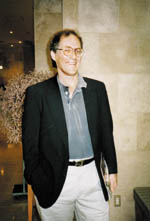
Tim O'Reilly - the OSS interview
- Interviewed by Steven Myers -

CJ's Steve Myers sat down with Tim O'Reilly, President and CEO of O'Reilly and Associates - and a major OSS proponent - the day after the Tokyo Perl Conference to talk about the current state of Perl and open source software. Here are some excerpts from that conversation.
Tim O'Reilly: Well, one thing we're seeing at the moment is the birth of a new kind of application - what I've started calling 'infoware' - and this includes sites like Amazon and Yahoo. We used to think of large websites as being repositories for documents, but they're really software apps that happen to contain large amounts of information. I was talking with some people the other today who were thinking about getting Web access because they wanted to use Amazon. And you know, that's the classic 'killer app' example - they wanted [to access] the Web in order to use the 'book-and-CD ordering' application.
What are your thoughts on the role of Perl in the creation and maintenance of these applications? O'Reilly: Perl is a key enabler, and seriously important to all of them. Look at Yahoo, for example - the kinds of things they do really emphasize Perl's strengths as a text-processing language and as a glue language. Every day Yahoo has to put together hundreds of megabytes of constantly changing data into a user interface, and Perl is a key part of that process. The term 'Perl is the duct tape of the Internet,' has been coined, and when you think about what people do with duct tape - taping down microphone cords at a conference or taping up the lights on a movie set - it's for stuff that's being put up and taken down all the time, and that's exactly what happens with these applications. Another good example: Jeffrey Friedl (author ofMastering Regular Expressions), a full-time Perl programmer at Yahoo who works in the quotes division, tells me that every day they have to check for financial news on 15,000 different companies. They have all these feeds coming in and Perl programs that are designed to match up news stories to tickers, and the programmers are constantly finding things, putting them together, and mixing the data into the interface. They also have Perl robots that go out and check pages to make sure that links work and whatnot, taking pages out of the catalog if they get errors, things like that. It made me think of the Tokugawa shrine in Nikko, where you've got all these gardeners who are always raking things out and keeping the area neat and organized, and it's like these Perl robots are the gardeners of the huge websites. It seems your letter to Microsoft about the Halloween memorandum created quite a stir. O'Reilly: Yeah, it's funny, that was kind of a last minute thing - I was going off somewhere and someone said you really ought to write an open letter to Microsoft, so I just kind of dashed it off in three minutes and off it went. But you know, Microsoft has made billions of dollars off OSS - they're the biggest winner yet in the OSS game. But the problem that I have is now they're saying 'we want to subvert this process' - and that's pretty short-sighted. It's kind of like a lumber company going into clear-cutting and not planting any new trees. I think its great for them to harvest the trees and go make their own version of the lumber - especially if there are enough trees so that other people can be doing it for free. I do have a problem, though, when they say "We have to cut down every tree, make sure there are none left for anyone else, and we're not going to plant any more." (laughs). What are your comments on all of the media attention given to OSS lately? O'Reilly: I think there's a much bigger picture associated with OSS than what's been portrayed so far. You know at first, there was this whole image of open source as being done by a bunch of free-thinking hackers who say "all intellectual property is bad," and then it kind of migrated to being all about Linux. My personal take on OSS is that it's kind of about the progress of science. You know, the real roots of OSS are in the research and academic communities, the universities. It goes back to the Renaissance - people progress by sharing information. The Internet has in many ways brought about a new Renaissance, just as the first Renaissance was brought about by the printing press. The Internet was built with the same kind of methodology - basically consisting of people building tools and collaborating with no central command or control. Each person did something that was useful and meaningful to him personally and the whole thing evolved in that manner. I feel it's one of the crowning achievements of our society. We really are participating in a new Renaissance right now and open source software is one of the key components making it happen.
|
Back to the table of contents
